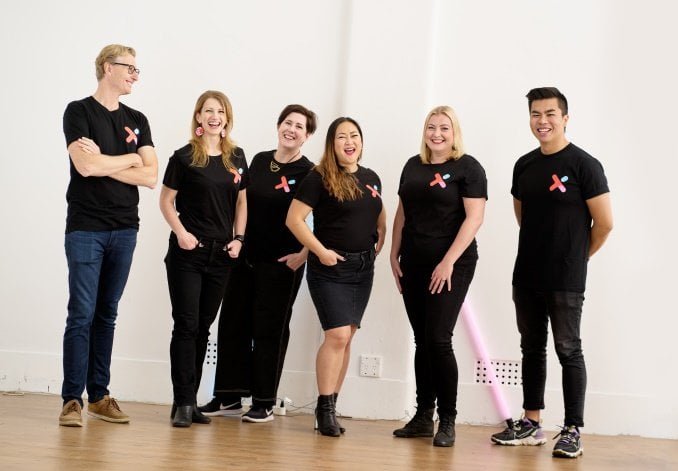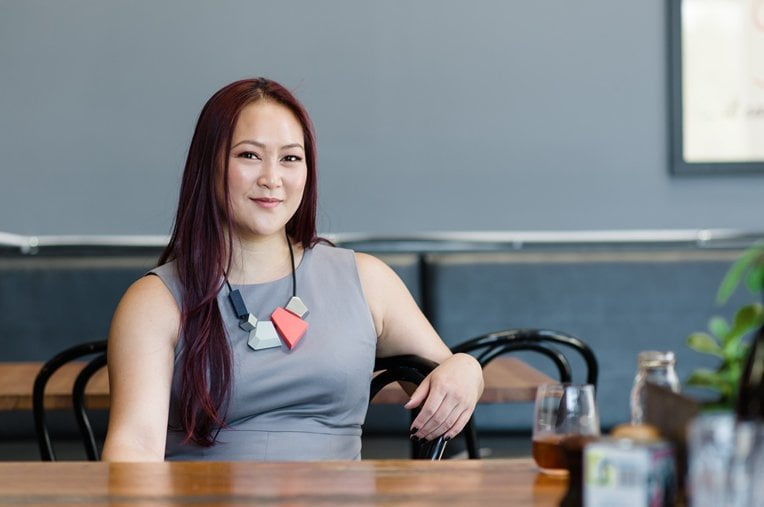Founder story: Jeanette Cheah from HEX
The HEX founder story
Moving from a well-paid bank job to the great unknown of founding a startup was a risk Jeanette Cheah was willing to take.
It paid off pretty quickly only to be thrown back into question when COVID hit HEX, her global education business. Given her focus on teaching innovation and creativity, it would’ve been off brand to walk away…
So Jeanette and her team doubled down, doubled in size and developed big plans to disrupt the education system. Here, Jeanette shares her founder story so far which, among other things, proves that light bulb moments aren’t essential for entrepreneurs.
In one sentence, what is HEX?
HEX is a next-gen education organisation teaching crucial innovation, entrepreneurship and employability skills to future leaders.

What problem are you solving?
We are solving the problems caused by the education system being linear and holding talent captive.
That’s a problem for individuals – higher education takes too long and there are not many ways for people to explore tech careers at the pace of tech itself. In turn, that’s a problem for employers and ultimately, the world’s ability to solve some of the big challenges we’re facing. There’s a huge shortage of tech talent, and there’s a shortage of talent that is creative, innovative and tech literate – the kind of person who can get your team out of a global pandemic in one piece!
Did you have a light bulb moment?
No, not all entrepreneurs have one. It’s often about seeing a problem and experimenting with how to solve it.
When I was working in the innovation team at ANZ, I studied UX and met all these creative and digitally literate people who were really talented but not networked. I like to connect people so I started exploring from there and the problem – of the current education system trapping talent – began to reveal itself and I had a feeling that this could be what I was meant to do. It felt like part of my life’s work.
How did you get started?
We created our very first program, which RMIT backed by accrediting it – we probably knocked on about 30 doors before we found the right person at the uni to do that. Then we convinced seven students to try it and we flew them to Silicon Valley for two weeks.
I took three months off work on what I called “startup parental leave”. I came back part time for a little while but after about nine months I had the courage to leave as we began making money. We scaled quickly to run programs in innovation capitals like Melbourne, Tel Aviv and Singapore. It was quite easy to replicate our Silicon Valley model before COVID, when we pivoted quite hard.
Right from the start, our strategy was to get a trusted organisation to back us and repeat that. We now have more than 30 partnerships from universities around the world who credit our programs – you can earn a full subject’s credit in 5.5 days with us. We’ve hacked the system by delivering high quality learning experiences and outcomes. We focus on developing innovation skills to give people the foundations to open up lots of different pathways so they’re ready for whatever the future brings.
What funding sources have you used?
We’ve been bootstrapped until recently when we took on revenue-based financing with Tractor Ventures.
We’re also in the middle of our first capital raise to fund our growth strategy, which is based on disrupting the linear education model.

What stage are you at now?
Last year (2020), we had to decide whether to take six months off and take JobKeeper or pivot hard into digital and work with universities to deliver online learning.
It was tough because our programs up until then had been 100% travel based. But we got the team together and mapped out all the different scenarios that could happen. Then we went in pretty bold and learnt the tech and tested new products very quickly. It paid off and we were able to pivot and scale to the US, Canada, the UK and New Zealand. We kept our team with no wage cuts and have gone on to double our head count to 12 since the start of this year. Our team has also upskilled in ways we weren’t expecting, which has been a win.
Most recently, we have partnered with Atlassian, which has provided us with a pool of mentors and advice on program design. It’s awesome to see them recognise our ability to build tech talent.
How have we helped?
We began working with Standard Ledger a few months ago to outsource the accounting basics – bookkeeping and payroll mainly. It’s reassuring to know that we have that infrastructure and team behind us as we get set up to scale further.
I’m finding Remco and the team’s knowledge of startup finance really valuable as well. They’re great at responding to my random questions about valuations and things!
The biggest piece of work though, has been working with John Nixon on our grant application to the Australian Government’s Boosting Female Founders Initiative. I have really enjoyed working with John on that. It’s an absolute beast of a grant process.

What personal sacrifices are behind your success?
Moving from a well-paid corporate salary in the banking sector to no income was pretty scary at the start. I had to be willing to wear that risk.
As a founder, there are weeks when you don’t sleep because you’re trying to solve something in your mind. That takes a toll, and that’s tough, but the pay off is when I look at my team and see the change we’re making – it’s a great pay off.
Part of the reason I do this is because I want to prove there are different ways of doing business that are values driven and inclusive as opposed to growing at all costs. It’s only by doing it that we can show the market there are other ways.
It’s not really a personal sacrifice but I think it’s worth calling out the huge funding gap for women-led companies. The stats haven’t moved, and it’s still the case that around 3% of venture capital funds go to women founders. When swapping stories with my peers, I notice the difference in lines of questioning and some of the assumptions people make, for example, regarding my tech background – even though I used to lead tech product at ANZ Innovation. It may be unconscious bias, but it’s still there. And I fully intend to be one of the founders who steps up to reduce this sort of inequity across the ecosystem.
What’s on the horizon?
We’re doubling down on the niche product that we’ve iterated to find. It’s a professional gap year product called HEX Ed, which we see becoming embedded in the education system across the globe to disrupt the traditional linear education model. We are capital raising to hire talent to build this out and target partnerships in big markets including the US, India and Australia.
We’ll also be launching HEX World, which is the community infrastructure that backs up the education.
More founder stories
A big thanks to Jeanette for her time in sharing her story.
As for more founder stories? You got it. We have plenty more from founders we’re stoked to work with like Alex Garlan from SignOnSite and Jock Lawrence from Mobble. You can also head here for our very own founder story.
As always, we’re here to chat if you need help with your startup. Just choose a time that works for you.
. . . . . . . . . . . . . . . . . . . . . . . . . . . . . .
Events coming up
Expanding to the UK: Startup Finance and Legal Basics
More articles
- Starting Out, Early Stage, Scaling Up
- Starting Out, Early Stage, Scaling Up
- Starting Out, Scaling Up, Expanding/Exiting





